
Upcoming Conference: “Thinking Under Fire: Bion for Today”
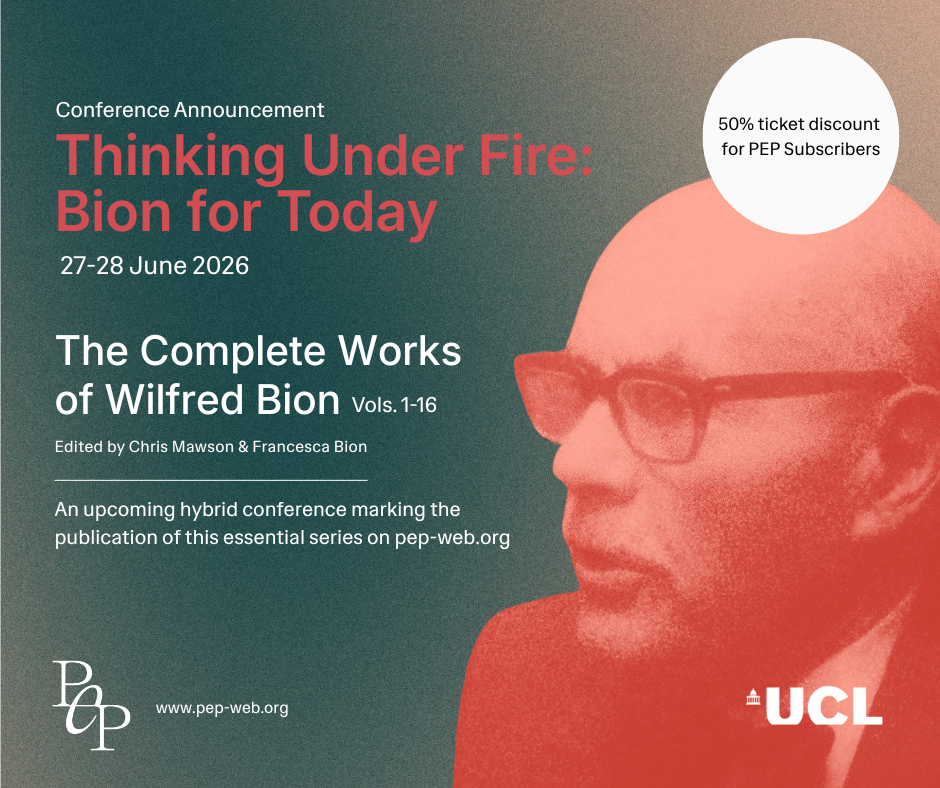
Celebrating the publication of “The Complete Works of W. R. Bion, Volumes 1-16” on PEP
PEP subscribers receive a 50% reduction on the attendance fee. See the full programme and register here.
The publication of “The Complete Works of W. R. Bion” in 2014, edited by Chris Mawson in consultation with Francesca Bion, was a milestone in Bion scholarship. The release of this essential series on PEP in 2026 creates further exciting opportunities for exploration of and dialogue with his work.
PEP has teamed up with the UCL Psychoanalysis Unit to offer an exciting hybrid conference with a range of presentations which seek to develop new lines of thinking about the significance of Bion’s contributions.
Speakers include Nicola Abel-Hirsch, Giuseppe Civitarese, Tobias Jenkins, Jani Santamaría Linares, Donna Savery, David Taylor, and Rudi Vermote.
Join us in June 2026 to explore the ways in which engagement with Bion’s work can facilitate psychoanalytic inquiry.
📅 Saturday 27-Sunday 28 June 2026
💻 Hybrid Event: In-person at UCL, London, UK, and Online.
PEP video interview with Edna O’Shaughnessy – now with Ukrainian captions.

Through a joint project between PEP and the Ukrainian Psychoanalytic Society, selected PEP videos are to be be made available to subscribers with Ukrainian captions. The first video to be translated is a video interview with Edna O’Shaughnessy on ‘What is a Clinical Fact?’ for the PEP/UCL Top Authors Project Video Collection (2016).
Watch the video here.
To access different languages, click on the ‘CC’ captions icon on the video’s toolbar and select the language from the menu.
Stay tuned for further announcements!
Taylor & Francis Digital Journal Subscriptions
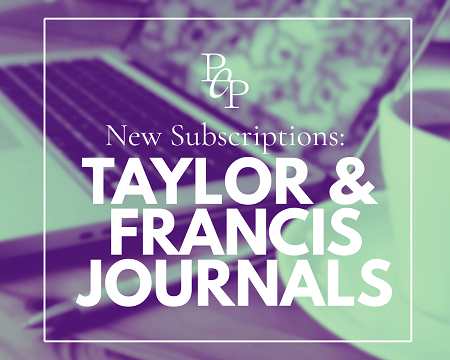
New on PEP-Web!
PEP and Taylor & Francis (T&F) are pleased to offer a new range of journal subscriptions to PEP-Web subscribers.
As you may know, the very latest issues of T&F journals on PEP-Web are subject to copyright embargoes of 3 years, which means that although these articles are indexed and fully searchable, subscribers can only read the author’s name, title, and abstract. Each year in January with PEP-Web’s Annual Release a further 12 months of journal issues becomes available to subscribers.
But why wait? You can now purchase a subscription to the following current T&F journal titles and gain full access to all Volumes on PEP-Web up to the most recent. Subscriptions are valid for twelve months from the date of purchase and are for a digital (online) subscription only.
Available Titles
Journal of Child Psychotherapy
Journal of Infant, Child and Adolescent Psychotherapy
Neuropsychoanalysis
Psychoanalysis, Self and Context
Psychoanalytic Dialogues
Psychoanalytic Inquiry
Psychoanalytic Perspectives
Psychoanalytic Psychotherapy
Psychoanalytic Quarterly
Psychoanalytic Social Work
Psychoanalytic Study of the Child
Studies in Gender and Sexuality
The Scandinavian Psychoanalytic Review
Eligibility
T&F journal subscriptions are available to individuals who currently have an active PEP-Web subscription with personal log-in credentials to the platform.This includes members of an active group subscription that grants personal log-in credentials to its members.
Subscribe
Find out more and subscribe here.
New in PEP-Web Books!
‘The Technique and Practice of Psychoanalysis – Volume 1’ by Ralph R. Greenson (IUP, 1967).
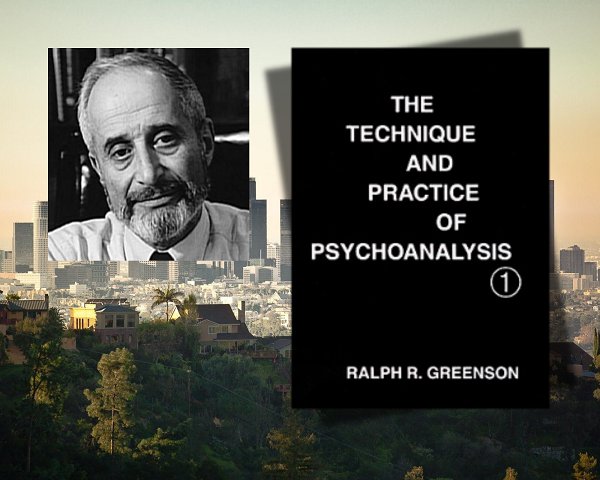
“In his introduction, Greenson acknowledges how vulnerable the analyst/writer is when he shows how he works. He then sets a good example himself …
The book can be read as a manual. The writing style is accessible: clear language, well-organized layouts, practice-oriented with numerous examples. All this makes it a pleasantly readable and above all useful manual …
It offers opportunities to compare the different perspectives and underlying models. As far as I am concerned, it can (again) be included in the reading lists of the various training courses” (From a review by Paul Wijts, Tijdschrift voor Psychoanalyse, 2019).
Chapter sections include: A Survey of Basic Concepts, Resistance, Transference, and the Psychoanalytic Situation.
The PEP-Web 2025 Release
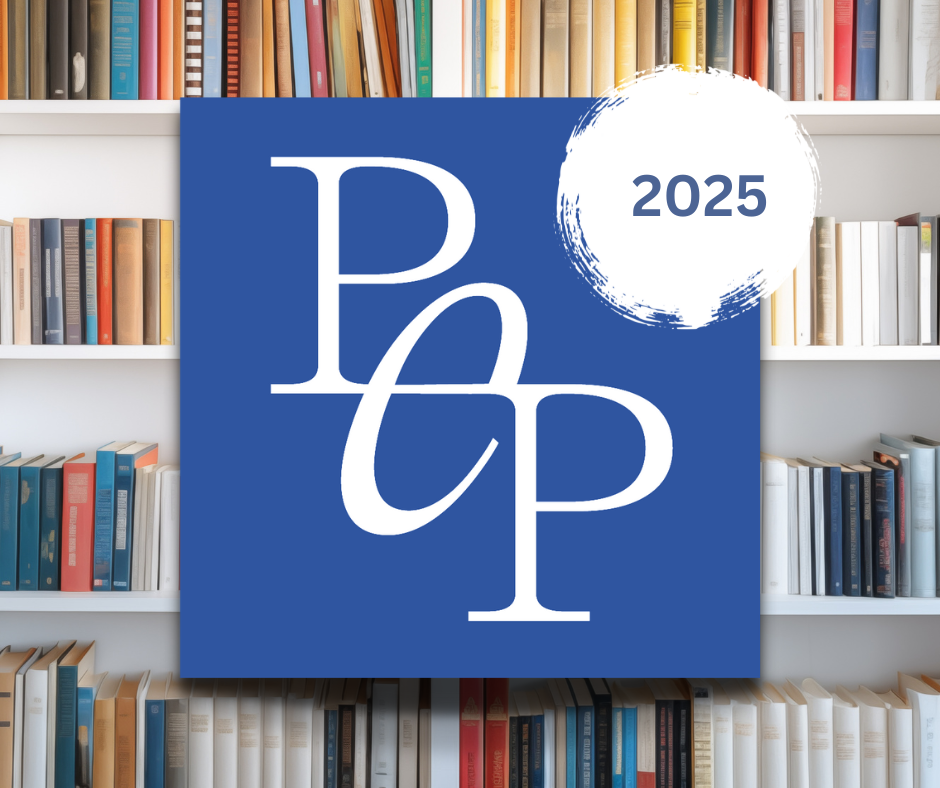
New on PEP-Web for 2025
This year, we are pleased to announce the continued expansion of our book catalogue. A further ten titles from the New Library of Psychoanalysis are now available. New entries cover themes such as child psychoanalysis, the work of Francis Tustin, the role of the father, the body, projective identification, South American psychoanalysis, and seminal collections of papers by leading analysts.
Also released in 2025, are four volumes of Die Rundbriefe des »Geheimen Komitees« 1913-1927, edited by Gerhard Wittenberger and Christian Tögel, which contain over 400 circular letters from members of Freud’s “Secret Committee”. The books provide rich detail of the early years of psychoanalysis. See Volume 1 here.
The PEP-Web video collection now includes interviews with key French psychoanalysts authored by Marianne Persine, former head of the Paris Psychoanalytical Society (SPP) Archives. Being transcribed by PEP in both English and French, this video series will enable vital yet previously untranslated dialogues to be made available to PEP subscribers. The first video of the series features .
2025 also sees the inclusion of a new video collection from the Contemporary Freudian Society, including the webinar Remembering Henri Rey: Michael Feldman & John Steiner in Dialogue.
With this release, subscribers also gain access to a further year of all current journals which move out of the publisher’s embargo period: 2021 is now available for publications with 3-year embargoes and 2019 for those with 5-year embargoes. See full details of current embargoes here.
We are also excited to announce that new journal titles will also be appearing on PEP-Web throughout 2025!
Just released on PEP-Web, Language and Psychoanalysis is the only interdisciplinary journal with a strong focus on the qualitative and quantitative analysis of language and psychoanalysis. Articles cover a range of subjects including methodology, theory, philosophy, child development, psychopathology, psychotherapy, embodied cognition, cognitive science, applied dynamical system theory, consciousness studies, cross-cultural research, and case studies.
2025 Release Summary
With this update, PEP-Web contains the complete text and illustrations of 84 premier journals in psychoanalysis, 140 classic psychoanalytic books, 25 preview books, 129 videos, and the full text and editorial notes of the 24 volumes of the Standard Edition of the Complete Psychological Works of Sigmund Freud as well as the 19 volume German Gesammelte Werke.
The PEP archive spans over 116 publication years and contains the full text of articles whose source ranges from 1909 through 2025. There are over 152,000 articles and over 21,000 figures and illustrations that originally resided on 2800 volumes with over 1.38 million printed pages.
Your feedback matters! Please help us improve by providing feedback and reporting any issues or errors using the “Help” Menu.
Originally posted: Jan 21, 2025
Data Error and Feedback Forms Restored
PEP-Web’s ‘Report a Data Error’ and ‘Provide Feedback’ forms were temporarily out of action, but the issue has now been fixed.
If you wish to use these forms, click the ‘Help’ icon (‘?’) in the main toolbar on the homepage and then select the form from the dropdown menu. Full details of how to use these forms can be found here.

New Journal on PEP-Web!

New to PEP-Web – Language and Psychoanalysis (2012-2022). The only interdisciplinary journal with a strong focus on the qualitative and quantitative analysis of language and psychoanalysis. The journal is also inclusive and not narrowly confined to the Freudian psychoanalytic theory but open to all language-based psychotherapeutic modalities.
Original contributions further the understanding of the interaction between Linguistic Analysis and Theory & Psychotherapeutic Theories and Techniques. Topics include methodology, theory, philosophy, child development, psychopathology, psychotherapy, embodied cognition, cognitive science, applied dynamical system theory, consciousness studies, cross-cultural research, and case studies.
Language and Psychoanalysis is a fully peer-reviewed and Open Access journal. It is therefore free to view for all PEP-Web users.
New Video on PEP-Web!
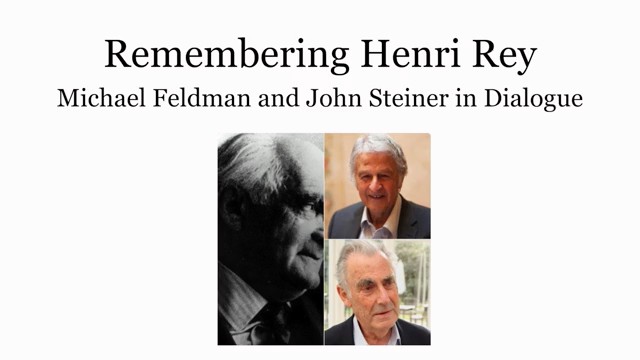
Remembering Henri Rey: Michael Feldman and John Steiner in Dialogue.
This fascinating webinar by the Contemporary Freudian Society took place in January 2024 and can now be enjoyed as a fully transcribed video on PEP-Web.
The video features Michael Feldman, John Steiner, Susan Finkelstein and Heinz Weiss in dialogue about the work of Mauritian/British psychoanalyst and psychiatrist Henri Rey. Moderated by CFS President Michael Krass.
More about Henri Rey here.
New in PEP-Web Books!
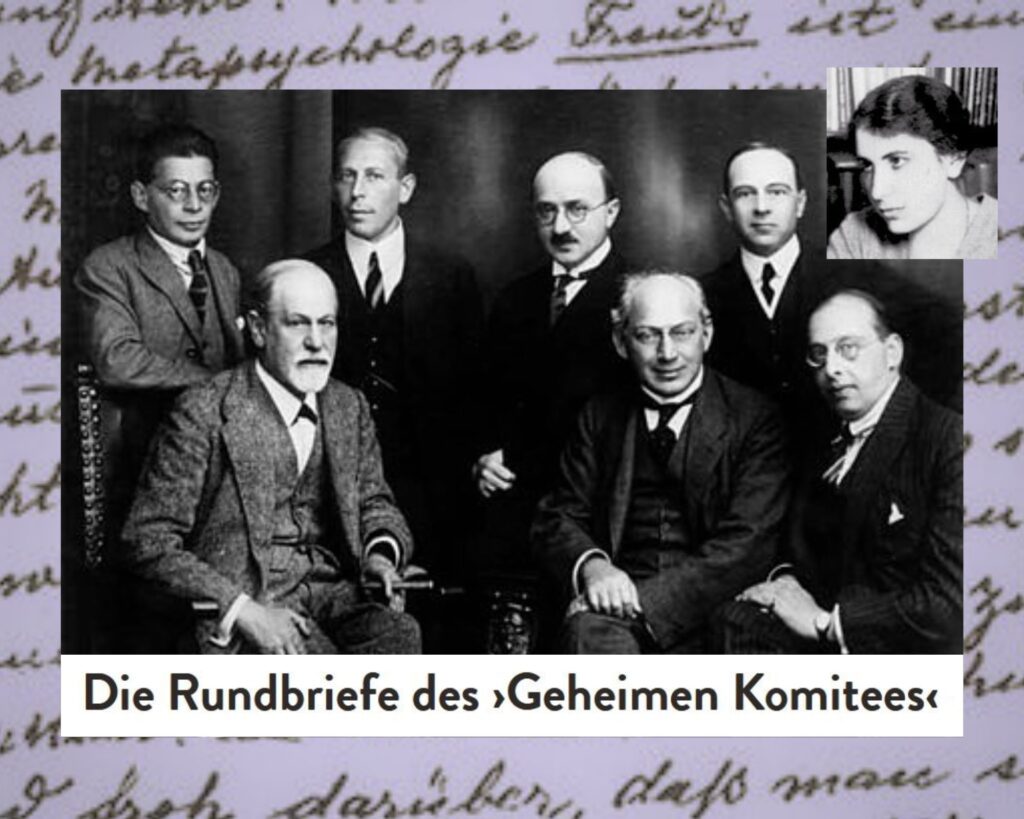
Die Rundbriefe des >Geheimen Komitees< Vols.1-4, Edited by Gerhard Wittenberger and Christfried Tögel (Edition Diskord)
The 4 volumes reproduce over 400 circular letters of Freud’s ‘Secret Committee’ between 1913 and 1927.
Volume 1: https://pep-web.org/browse/document/RGK.001.0000A
Volume 2: https://pep-web.org/browse/document/RGK.002.0000A
Volume 3: https://pep-web.org/browse/document/RGK.003.0000A
Volume 4: https://pep-web.org/browse/document/RGK.004.0000A
Established in 1912 in order to advance the cause of psychoanalysis and defend it against external attacks, the group corresponded intensively with each other for many years.
The newsletters deal with topics such as congresses and committee meetings, translations of Freud’s writings, financial issues, the editorial policy of the journals, book reviews, training issues, personnel policy, events in the local branch associations, and occasionally personal matters.
Conflicts and tensions shine through the discussion of these topics, which turn a business correspondence – which the newsletters superficially represent – into documents into the inner dynamics of a group of men, each of whom had more or less hopes of being chosen as Freud’s successor.
Image / Members of the Secret Committee at the 7th International Psychoanalytic Congress, Berlin, 1922. Clockwise: Otto Rank, Karl Abraham, Max Eitingon, Ernest Jones, Hanns Sachs, Sándor Ferenczi and Sigmund Freud; Anna Freud inset.
Announcing a New Book Feature: PEP Preview!
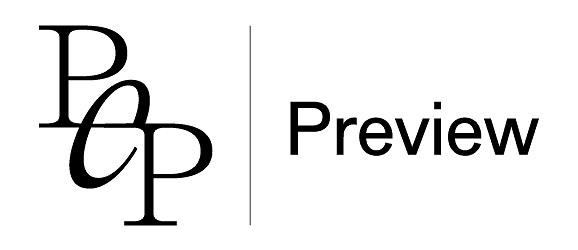
PEP is excited to announce the release of PEP Preview, a new book feature showcasing a wide array of digitized titles from major publishers. Users will be able to discover a range of key psychoanalytic works, including the latest publications.
How PEP Preview Works
The books featured in PEP Preview are fully integrated into the archive.
- Fully Text-Searchable. When you enter search terms, Preview books containing a match will display in your search results.
- Accessible Content. A significant portion of each book is available to view in the archive.
- Purchase Options. If you find a book you like, there are direct links to the publishers where you can purchase a copy.
Available Titles
In this initial release, PEP users can browse recent titles from the New Library of Psychoanalysis (NLP) and Rowman & Littlefield.

The NLP series aims to stimulate the interchange of ideas across different schools of psychoanalysis internationally, and between psychoanalysis and other disciplines. Some current releases featured in PEP Preview include Margaret Rustin’s Finding a Way to the Child: Selected Clinical Papers 1983-2021 (2023), R. D. Hinshelwood’s W.R. Bion as Clinician: Steering Between Concept and Practice (2023), and David Black’s Psychoanalysis and Ethics: The Necessity of Perspective (2024). Previews of new titles will appear as they are published, with the NLP Teaching and Beyond the Couch Series to feature in future releases.

From Rowman & Littlefield, users can explore Knowing What Psychoanalysts Do and Doing What Psychoanalysts Know (2023) by David Tuckett and colleagues. A compendium of over 20 years of research by the European Psychoanalytical Federations’ (EPF) Comparative Clinical Methods project, the book introduces an innovative theoretical framework for reflecting on and discussing everyday clinical work.
Did you know? The authors of Knowing What Psychoanalysts Do and Doing What Psychoanalysts Know will be discussing and debating the book’s central ideas at a dedicated hybrid conference at UCL on 14-15 June 2024, discover more here.
To receive notifications of new releases, please follow us on Facebook or LinkedIn, or visit PEP Support for updates.
The PEP-Web 2024 Release is Here!
New on PEP-Web for 2024
This year, we are pleased to announce a substantial increase in our book catalogue with a range of contemporary titles from the New Library of Psychoanalysis. This series aims to stimulate the interchange of ideas across different schools of psychoanalysis internationally, and between psychoanalysis and other disciplines. New entries include studies on psychoanalytic education and clinical methodology, seminal collections of papers by leading analysts, as well as a contemporary clinical glossary.
The PEP-Web video collection currently contains 125 videos and is continually expanding! All videos are professionally transcribed and fully-indexed, allowing their content to be searchable.
With this new release, subscribers also gain access to a further year of all current journals which move out of the publisher’s embargo period: 2020 is now available for publications with 3-year embargoes and 2018 for those with 5-year embargoes.
Platform Updates
Scheduled for an interim release in 2024, PEP Preview is a new feature that will showcase a much wider collection of digitized titles from major publishers. The books in this collection will be fully text-searchable, with significant portions available on the platform, and with an option to acquire them directly from the publisher.
Your feedback matters! Please help us improve by providing feedback and reporting any errors using the “Help” Menu.
Release Summary
This new release of PEP-Web contains the complete text and illustrations of 83 premier journals in psychoanalysis, 125 classic psychoanalytic books, 125 videos, and the full text and editorial notes of the 24 volumes of the Standard Edition of the Complete Psychological Works of Sigmund Freud as well as the 19 volume German Gesammelte Werke.
The PEP archive spans over 114 publication years and contains the full text of articles whose source ranges from 1909 through 2023. There are over 148,030 articles and 20,564 figures and illustrations that originally resided on 2744 volumes with over 1.34 million printed pages.
Tip: How to access the glossary when viewing an article.
To access a glossary of psychoanalytic terms when reading an article, follow the steps below:
On the homepage: https://pep-web.org/ in the right-hand side panel there is an Info Card folder labeled ‘Glossary terms’. Note, you must be logged in to view the Info Cards, including ‘Glossary terms’.
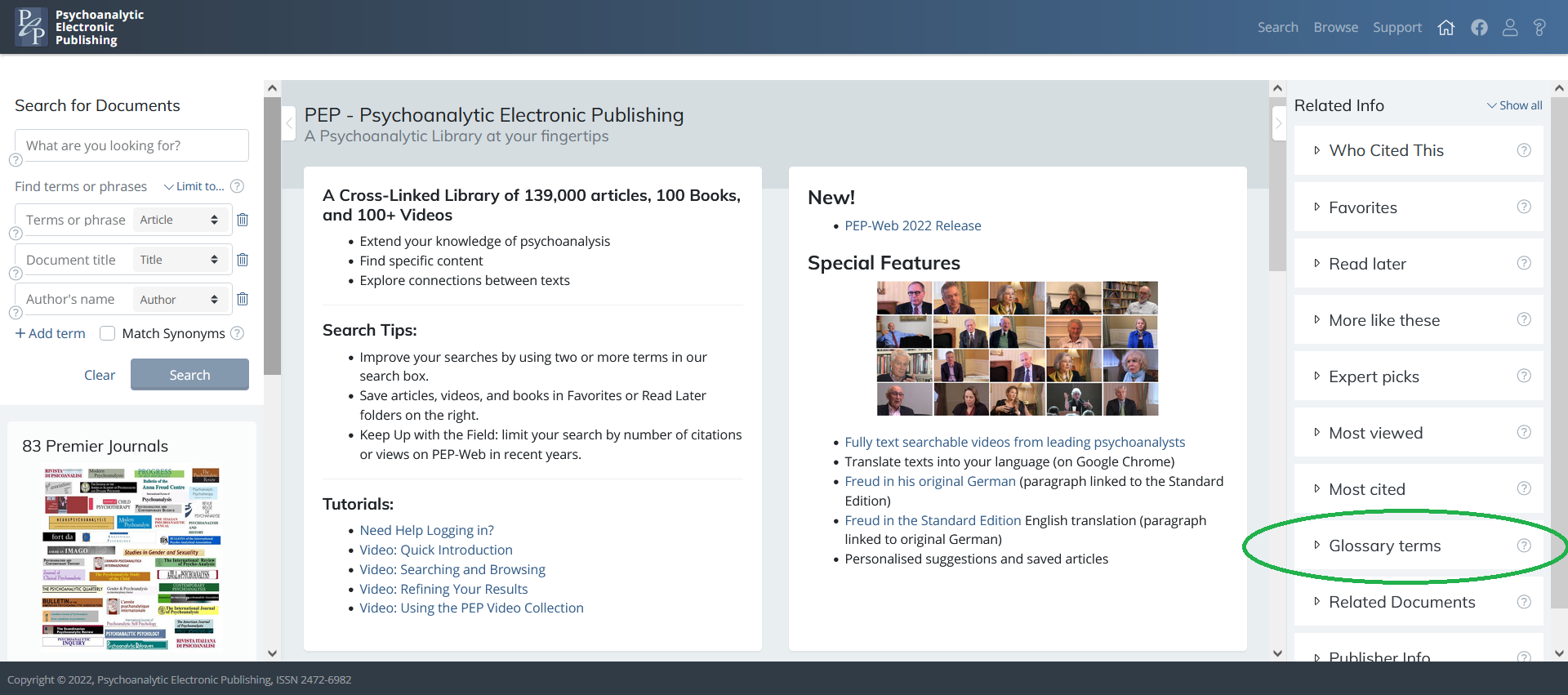
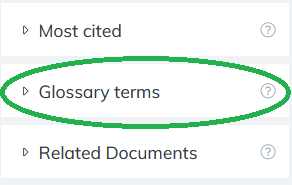
To use this function: First, open an article so it is displayed in the central reading panel, then click on the ‘Glossary terms’ Info Card in the right-hand side panel. It will open and display a list of psychoanalytic terms that are to be found in the current article.
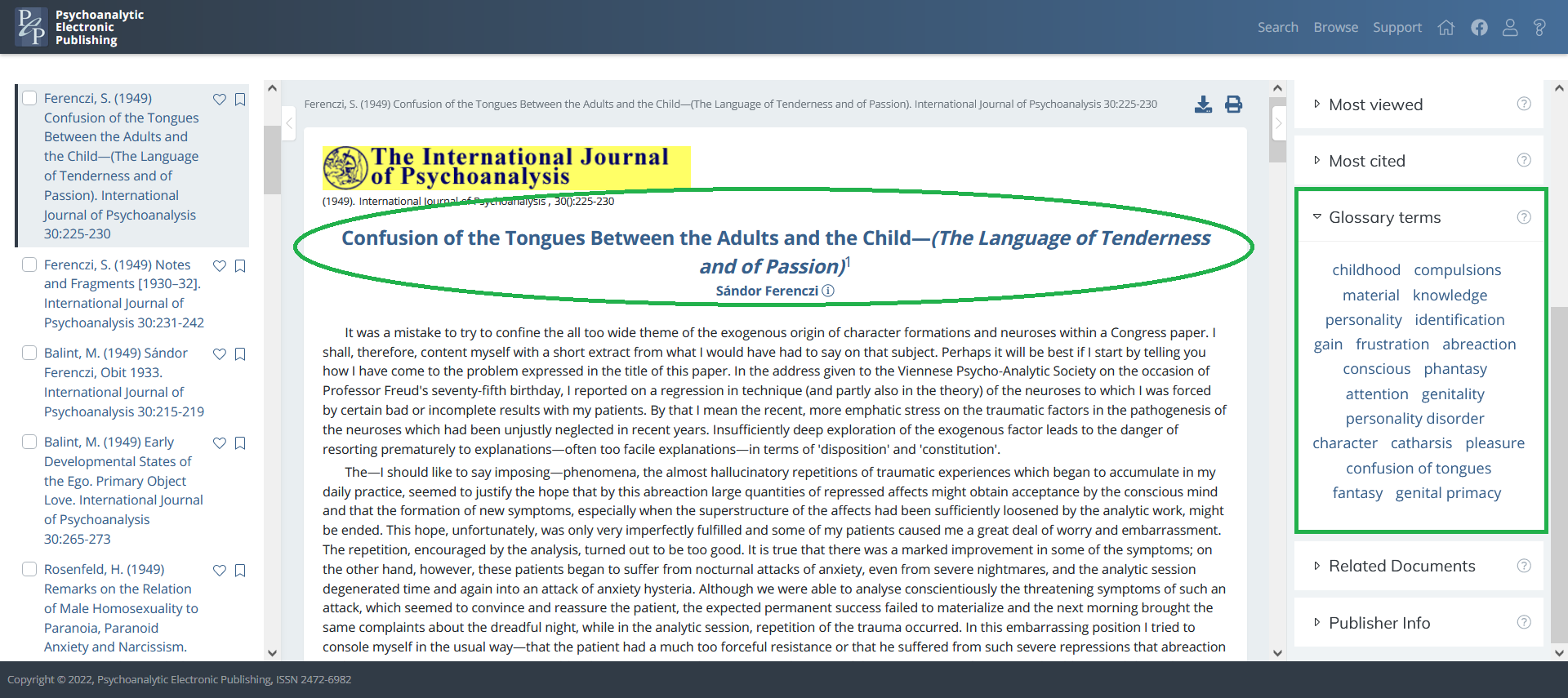
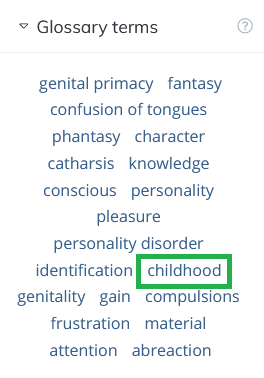
The glossary terms showing in the Info card are hyperlinked – if you click on a word or term a pop-up window will open in the center of the screen showing the consolidated glossary entries for that particular term. Within the pop-up window, other associated glossary terms are hyperlinked and will take you to their relevant glossary entries. To close the glossary and return to the article, in the pop-up window click on the ‘Close’ button or the ‘x’ in the top right corner.
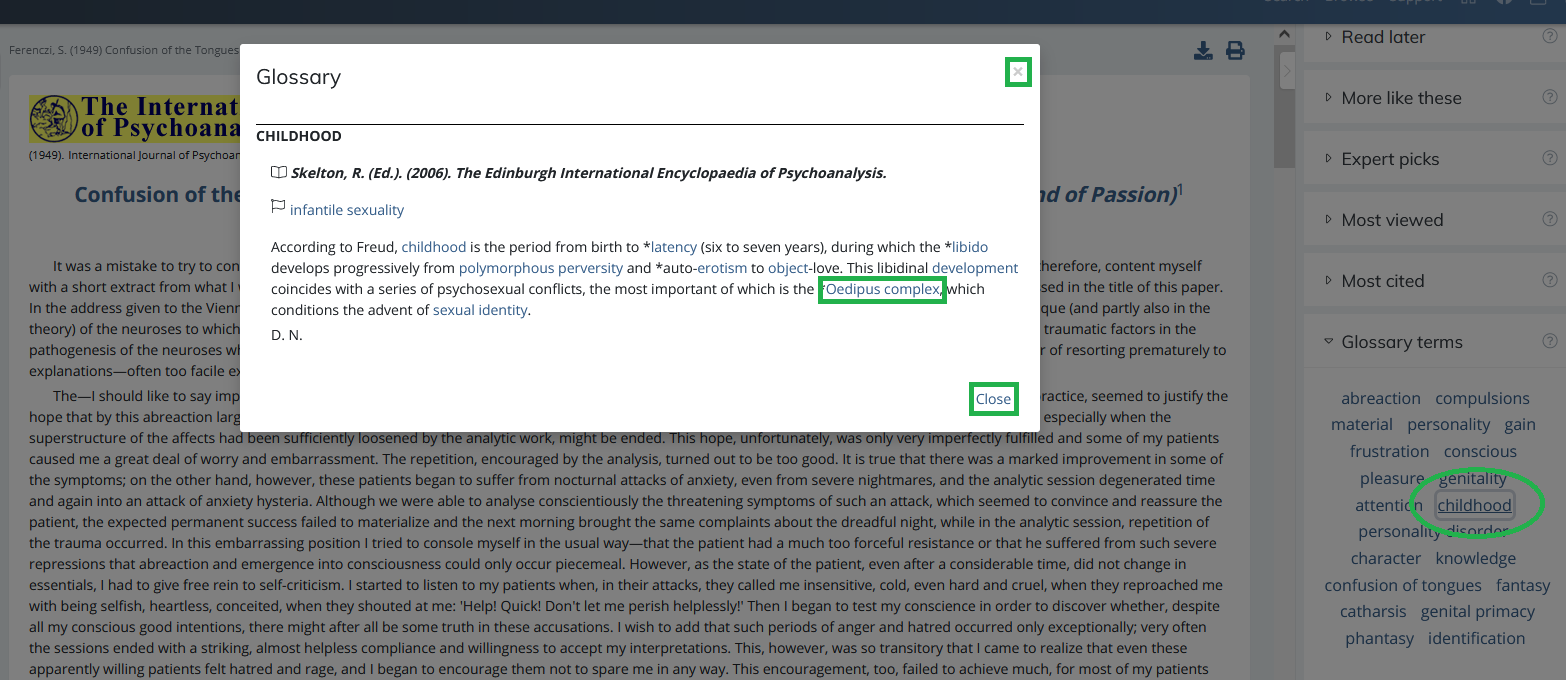
If you cannot immediately see the ‘Glossary terms’ Info card in the right-hand side panel, please check your ‘Preferences’ settings. To do this, click on the User Menu – the ‘Person’ icon on the main top toolbar (to the right) – and from the dropdown box that appears click on ‘Preferences’.
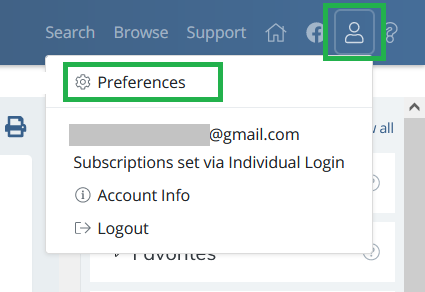
A menu box will appear in the center of the screen – on the right-hand side is a list of all the PEP ‘Info cards’. Select/unselect the button next to ‘Glossary terms’. Remember to click ‘Done’ to confirm your selection.
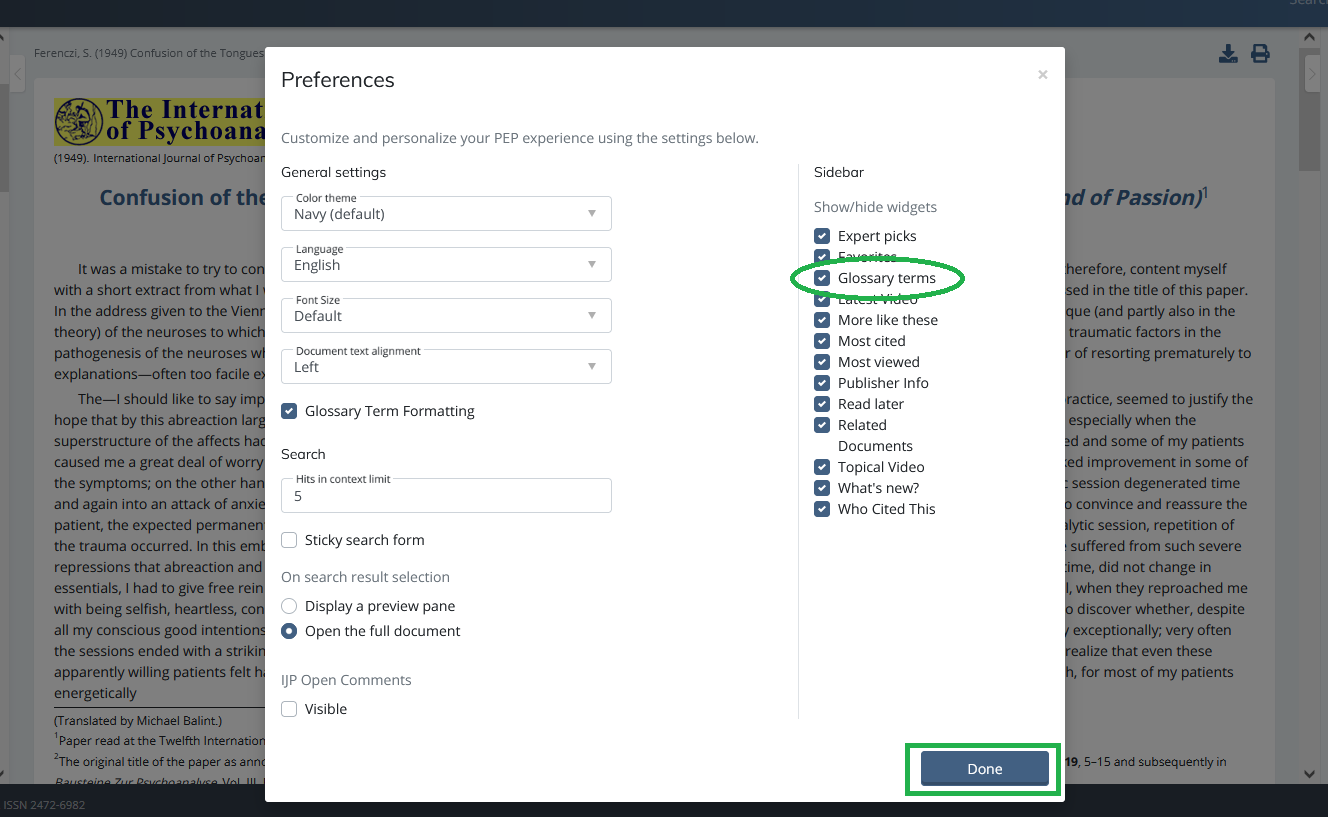
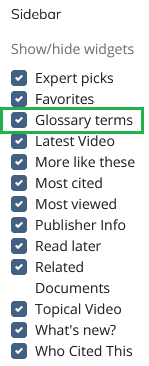
If you are accessing PEP via an institutional subscription, you will need to register for a free personal PEP account in order to have access to your own ‘Preferences’ settings and to the range of Info cards. Find out more about registering for a free account here.
Please note that when viewing articles, links to the glossary are now exclusively accessed via the ‘Glossary terms’ Info card in the right-hand side panel.
Read more about the PEP consolidated glossary.
Tip: Find out who cited a particular article.
To discover which papers cited a particular article, follow the steps below:
On the homepage: https://pep-web.org/ in the right-hand side panel there is a new ‘Info Card’ labelled ‘Who Cited This’.
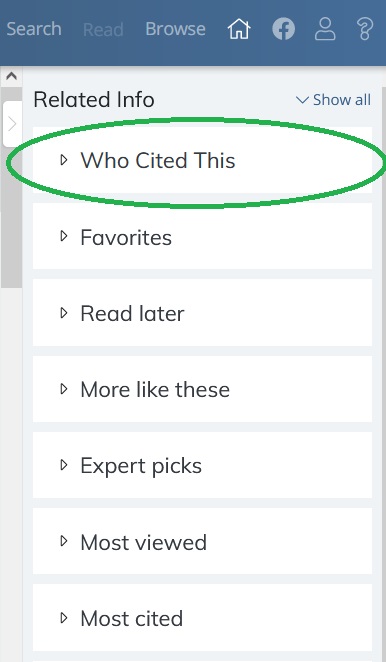
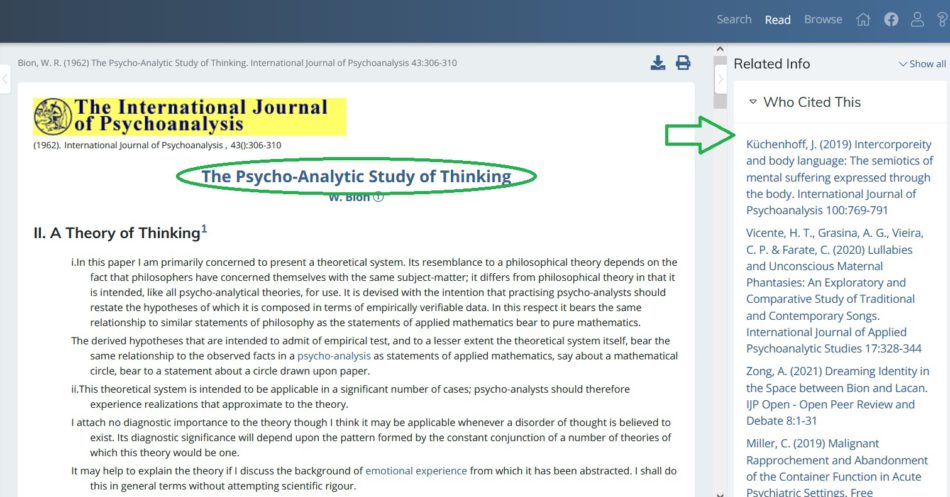
The ‘Who Cited This’ function can be turned on/off by visiting the ‘Preferences’ menu. To do this click on the ‘Person’ icon on the top toolbar (to the right) and from the dropdown box that appears click on ‘Preferences’. A menu box will appear in the center of the screen – on the right-hand side of the menu box, at the bottom of the list of items, you can select/unselect the button for ‘Who Cited This’. Remember to click ‘Done’ to confirm your selection.
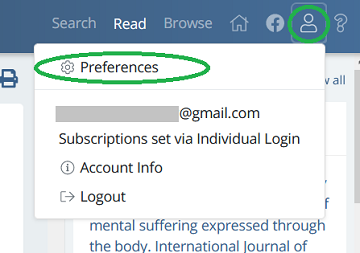
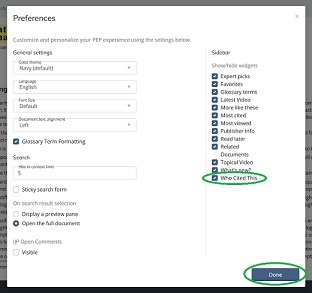
If you can’t immediately see the ‘Who Cited This’ Info card in the right-hand side panel, please check your ‘Preferences’ first by following the steps above to activate the feature.
If you are accessing PEP via an institutional subscription, you will need to register for a personal PEP account in order to have access to personal ‘Preferences’ settings. Find out more about registering for an account here.
Announcing the addition of Psychoanalysis, Culture & Society to PEP-Web
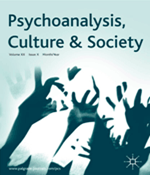
In an interim release (v2022), PEP has added the complete contents (26 volumes, 1996-current) of the journal, Psychoanalysis, Culture & Society, now available to all PEP-Web subscribers.
Currently in its twenty sixth year of publication, the academic journal, Psychoanalysis, Culture & Society was founded by an international group of academics to provide a space where critical intellectuals from the fields of politics, cultural studies, and the humanities, as well as both academic and clinical psychoanalysts could engage in dialog to understand pressing social trends.
A key underlying purpose of the journal is to explore issues of social justice and understand obstacles to progressive social change. The journal does not endorse any one single psychoanalytic viewpoint or orthodoxy but is open to a variety of psychoanalytic perspectives that address the intersection of psychoanalysis, culture and society and that explore pressing issues of equity, inequality, sustainability, theories of subject formation, and the potential for emancipatory clinical practice.
As well as rigorous Original Articles, the journal welcomes alternative and experimental forms of writing in its Counterspace, and also publishes reviews of new academic books in psychoanalysis and critical social sciences that are in line with its mission.
The journal is co-owned by international publisher Palgrave/Springer, and the Association for the Psychoanalysis of Culture & Society, which holds an annual academic meeting usually at Rutgers University in New Jersey, USA in late October. All articles published in the journal are subjected to rigorous peer review from members of our distinguished international Editorial Board.
Due to contracts with the publishers, there is a three-year moving wall (embargo of current articles) for Psychoanalysis, Culture & Society. This means, you can browse the tables of contents up through the current issue, and searches include the complete text of the articles, but only the titles and abstracts (or summaries) will be displayed for articles from 2019 and newer. For details on how to read the full text of 2019 and more current articles see the publisher’s official website here.
The PEP-Web 2022 Release is Here!
This release provides another year of all current publications which move out of the publisher’s embargo period: subscribers will have access to the 2018 issues of current journals with 3-year embargoes, and 2016 issues of journals with 5-year embargoes.
In addition, we have added 4 new journals!
➡ Journal of Psychological Therapies
➡ Oedipus Annual – Greek Annual Psychoanalytic Review
➡ Psychoanalysis and Psychotherapy in China
➡ The International Journal of Forensic Psychotherapy
A fifth journal is also in preparation:
➡ Psychoanalysis Culture and Society
Scheduled for an intermediate release in a few months, a selection of article abstracts are available now to subscribers.
IJP-Open returns to PEP-Web!
➡ IJP-Open – Open Peer Review and Debate
IJP-Open articles and commentary are accessible to all PEP-Web subscribers. Tip: Look for the “speech bubbles” icon, located next to the article’s “print” and “download” icons to open and join in the discussion.
With this release, we are also including fixes for many of the issues, which users have reported with the initial phase of the new PEP-Web interface. We will continue to do so, and to add and develop new features that benefit our users. Please help us improve by providing feedback and reporting errors using the “Help” icon.
This new release of PEP-Web contains the complete text and illustrations of 83 premier journals in psychoanalysis, 100 classic psychoanalytic books, 104 videos, and the full text and editorial notes of the 24 volumes of the Standard Edition of the Complete Psychological Works of Sigmund Freud as well as the 19 volume German Freud Standard Edition – Gesammelte Werke. It spans over 110 publication years and contains the full text of articles whose source ranges from 1911 through 2021. There are over 139,936 articles and 18,773 figures and illustrations that originally resided on 2591 volumes with over 1.25 million printed pages. In hard copy, the PEP-Web Archive represents a stack of paper more than 409 feet high and weighing over 5 tons!